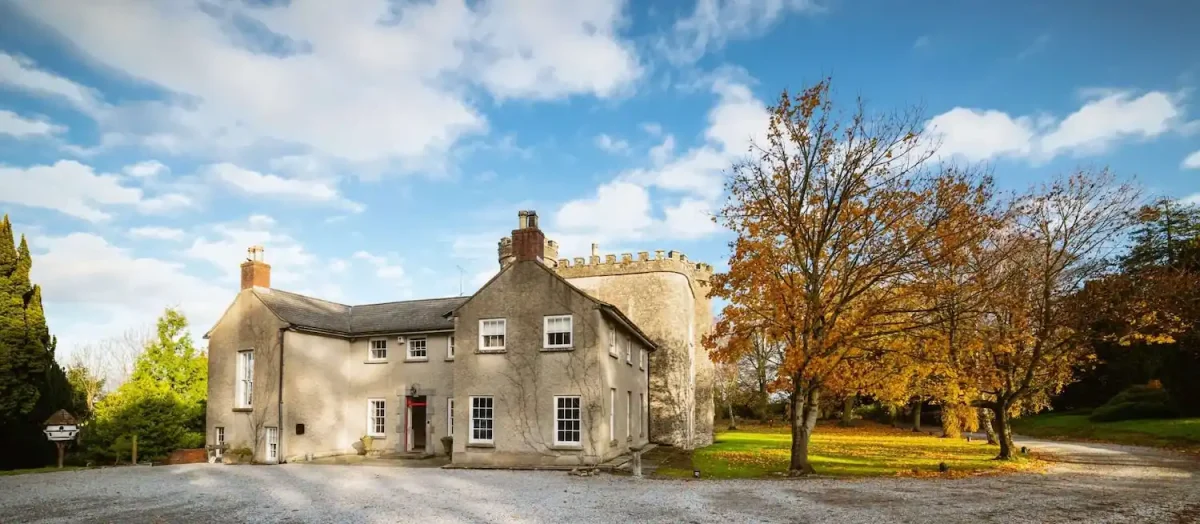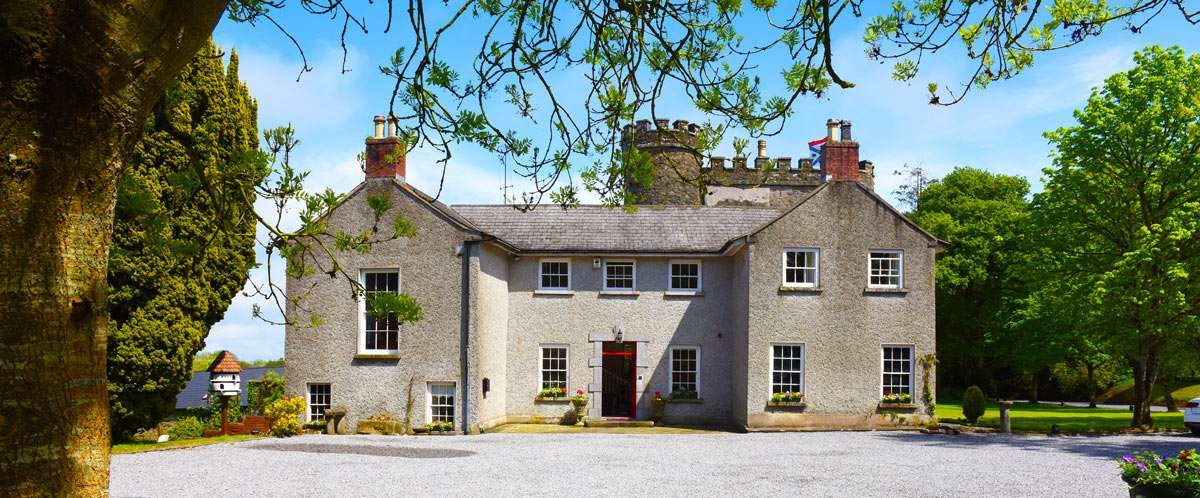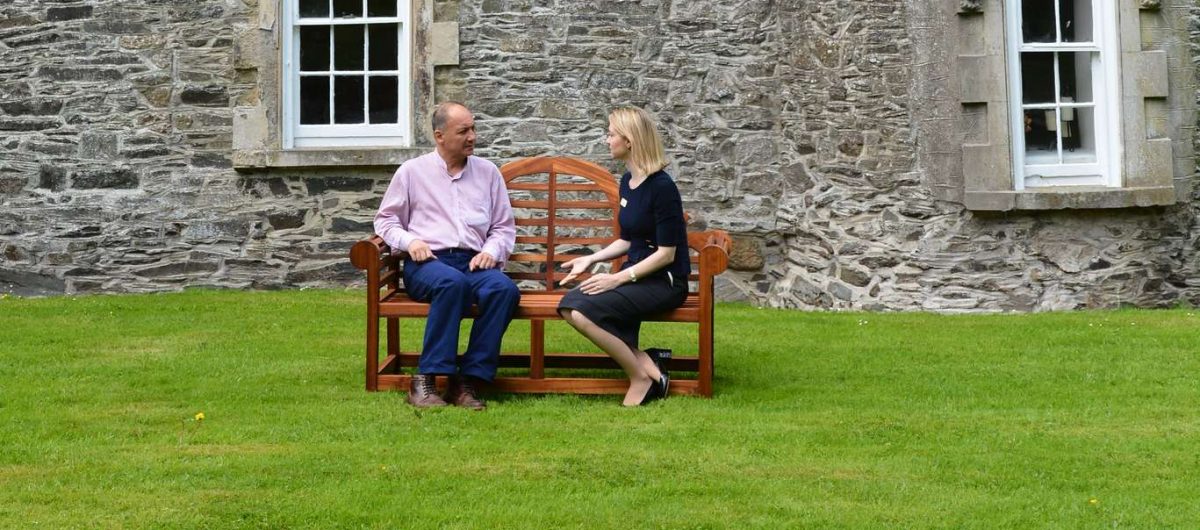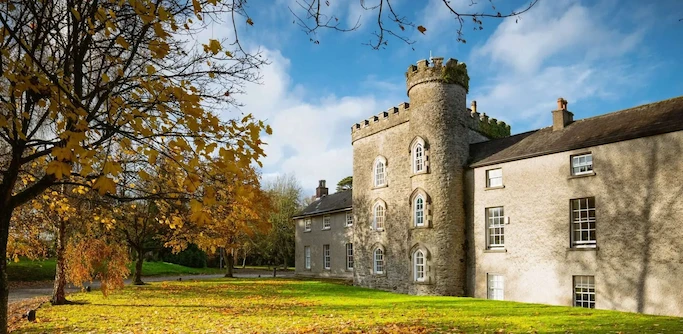
Drug Rehab Treatment
At Smarmore Castle drug rehab Ireland, we believe that in order for you to achieve the best possible start to your withdrawal from drug addiction, round-the-clock medical care and support are essential, which can provide a strong foundation for ongoing recovery. That is why our drug rehab programme has 24/7 care designed to help you address your drug use and safely stop consuming drugs.
Find the support you need and access residential treatment services to help manage your withdrawal effectively, move away from addiction and learn tools to prevent relapse, and gain access to structured aftercare options to support your ongoing recovery.
Drug Rehab at Smarmore Castle

At Smarmore Castle, we offer comprehensive, personalised addiction treatment services designed to address the physical, psychological, and emotional aspects of addiction. We holistically treat addiction throughout our residential treatment, using evidence-based therapies provided by accredited healthcare professionals.
If required, we can start your treatment with a medically supervised detox, followed by treatment options that work best for you, and ending with aftercare designed to prevent relapse and provide ongoing strategies to help you maintain abstinence.
You will find our historic treatment centre set in the beautiful surroundings of County Louth. Smarmore Castle offers you the safety and privacy you need throughout the early stages of your recovery.
During your stay, you will benefit from access to our facilities, enjoy healthy food, and have a comfortable, private place to rest and recover with 24/7 medical support. You will also join a like-minded community who are treading their own paths of recovery.
Contact Us
To find out more about private drug addiction treatment, contact a member of our team, today.
Drug Rehab Ireland: Drug Addiction Treatment
Our experienced team of consultants, therapists, and medical staff will guide you through every stage of your treatment. Your stay will begin with a clinical assessment to create a personalised treatment plan.
We will review your history of drug misuse and consider any additional challenges you may face. With a focus on compassionate, psychiatrist-led, clinical care, we aim to help you regain your confidence in maintaining abstinence from substances.
The Stages of Drug Rehab
Detoxification
If required, a medically supervised drug detox is offered at our detox treatment centre. Detox is often a critical first step in the treatment journey. It helps your body recover from the effects of substance misuse and allows us to support you in managing your withdrawal symptoms safely and effectively.
Therapeutic Treatment
At Smarmore Castle, we offer comprehensive, evidence-based treatment tailored to your individual needs. After an initial assessment and consultation with our medical team, we develop a personalised drug treatment plan that may include a variety of therapies delivered by our team of accredited practitioners such as:
| Peer support groups | 12 Step therapy | Gambling group |
| One-to-one therapy | Trauma therapy | Emotion-focused therapy |
| Group therapy | Sensorimotor psychotherapy | Men’s and women’s groups |
| Cognitive behavioural therapy (CBT) | Psychodynamic therapy | Reality therapy |
| Motivational interviewing therapy | Psychoeducational lectures and workshops | Sleep hygiene techniques |
| Family therapy | Chronic pain therapy |
In addition to clinical treatment, we offer a range of complementary therapies to enhance well-being, including:
- Aqua therapy
- Art therapy
- Equine (horse) therapy
- Mindfulness meditation
- Music and drumming therapy
- Creative writing
Are You Looking for Drug Addiction Support?
Call a member of our team to have a confidential chat about the addiction services available.
Family Therapy Programme
Substance misuse can have a devastating impact on the personal lives, careers, and relationships of the people around you, and repairing broken relationships with the people you love the most will be a crucial part of your recovery. Our family therapy programmes help to provide support to patients and families struggling from the effects of a loved one’s addiction to drugs. We aim to help them connect, rebuild their relationships, learn to communicate effectively, and discover coping skills and strategies that can help support an individual through the recovery process.
The more that families recognise and understand addiction and how to effectively support one another through recovery, the greater the chance that a family will have of repairing relationships and helping you to achieve lasting sobriety.
Aftercare/ Continuing Care Programmes
The aftercare programme is funded separately from your treatment, ensuring an uninterrupted, holistic recovery experience. You will be asked if you would like to take part in the continued care programme.

-
How it Works: Before Leaving Inpatient Treatment
A seamless transition into the next phase of your recovery is extremely important. In the final week of your inpatient programme, our focus will shift toward case management, and this will lay the foundation for your ongoing recovery.
Case management is a process designed to bridge the gap between rehab and your home life. Your focal therapist will take time to discuss your personal goals and challenges and will work closely with you to create a bespoke relapse prevention plan which will serve as a roadmap to help you navigate the post-rehab phase.
In this crucial week, a comprehensive assessment takes place to help pinpoint your specific needs across the different areas of your life. This might include securing stable housing, exploring employment opportunities, addressing legal issues, connecting with community resources and support groups and other additional professional support that will be instrumental in helping you maintain your sobriety.
-
How It Works: Transitioning from Inpatient to Continuing Care
We have several groups, both online and face-to-face. In the event of relapse, we have a re-entry group which patients engage in for 6 weeks before returning to the continuing care group.
-
Family members
A family member can join patients at our live aftercare groups. This allows the concerned person to experience aftercare and enjoy the benefits of a supportive community, learn coping strategies alongside their loved one, and gain a better understanding of the recovery process. This allows the family member to strengthen and build on their own recovery.
Group meetings may become a key priority in your weekly recovery schedule. Regular attendance and active participation help create a safe space where you can share openly, receive relevant feedback from fellow group members, and foster a supportive environment.
-
Relapse Protocol
Our comprehensive continuing care programme also has a clear pathway back to recovery for patients who may experience relapse. In the event of a relapse, we have a re-entry group that members are encouraged to attend. This group is designed to provide targeted assistance during a critical time and provides a focused approach to address the relapse and ensure that the patient has all the necessary tools and skills to prevent future relapses. Once patients have been in the re-entry group for six weeks and have an agreed plan, they can return to the original Continuing Care group.

Download our Brochure
Next Steps
Just by searching for information on drug rehab, you have taken an important first step. Whether you are looking for support for yourself or a loved one, you are not alone. The team at Smarmore Castle is here to help answer any queries you may have about our treatment programmes.
Download our brochure or contact us today to learn more about our residential programmes, or to find out more information about our other addiction services treating alcohol addiction, and other behavioural addictions such as gambling addiction.
Other Resources
If you are looking for additional support that is local to you, you can contact Narcotics Anonymous (NA), where you can build connections with other people who may be going through a similar journey.

Get In Touch
Frequently Asked Questions
-
What is a rehab programme?
A rehab programme is a structured treatment plan designed to help individuals overcome addiction to drugs, alcohol, or other harmful behaviours. It typically combines medical care, psychological therapies, and social support to address both the physical and emotional aspects of addiction.
Most rehab programmes include:
- Detoxification – A medically supervised process to manage withdrawal symptoms safely.
- Therapy – Individual and group counselling, often including cognitive behavioural therapy (CBT), trauma therapy, and 12 Step facilitation.
- Education and Relapse Prevention – Teaching individuals about addiction, coping strategies, and how to prevent relapse.
- Aftercare Planning – Ongoing support that continues after the main programme, such as outpatient therapy or support.
Rehab programmes can be delivered in residential (inpatient) settings, where individuals stay at the facility full-time, where they attend scheduled sessions while living at home. The most effective programmes are tailored to the individual’s needs and address co-occurring mental health conditions if present.
At Smarmore Castle, we provide a residential rehab programme personalised to each individual that tackles drug and alcohol addiction, as well as behavioural addictions such as gambling addiction.
-
What to say to someone in drug rehab?
When communicating with someone undergoing drug rehabilitation, it’s essential to offer support that is empathetic, non-judgmental, and encouraging. Here are some approaches1:
- Express pride and support: Let them know you’re proud of their decision to seek help and that you’re there for them during their recovery journey.
- Ask open-ended questions: Encourage dialogue by asking how they’re feeling or what they’ve learned, which can help them reflect on their progress and feel supported.
- Offer specific help: Ask if there’s anything specific you can do to support them, reinforcing that they’re not alone.
- Avoid judgmental language: Steer clear of comments that may induce guilt or shame. Instead, focus on positive reinforcement and understanding.
- Be patient and listen: Sometimes, just being there to listen without offering solutions can be incredibly comforting.
-
How does drug rehab work?
Drug rehab typically begins with a comprehensive assessment and a medically supervised detox if required. This is followed by a structured programme involving therapies such as:
- Cognitive behavioural therapy (CBT)
- 12 Step facilitation
- Group and individual therapy
- Relapse prevention
Many programmes also include support for dual diagnosis, trauma therapy, and aftercare planning to support long-term recovery. Effective rehab addresses both the physical and psychological aspects of addiction.
At Smarmore Castle, we provide a holistic approach to drug and alcohol services, offering detox, support for dual diagnosis, therapy for addiction, complementary therapies (such as aquatherapy and equine therapy), as well as aftercare support.
-
Can you make someone go to rehab in Ireland?
Addiction treatment is considered most effective when a person consents to it, as voluntary participation is strongly linked to better engagement and outcomes.
However, family members can encourage someone to seek help by expressing concern, setting boundaries, and offering support for treatment. In some cases, interventions—guided by a professional—may help motivate the person to accept treatment.
For minors (under 18), parents or legal guardians may consent to treatment on their behalf, but it is still best practice to involve the young person in decisions about their care.
At Smarmore Castle, we treat individuals over the age of 16 years only.
-
How long is drug rehab?
The duration of drug rehab varies depending on the individual’s needs, the severity of their addiction, and the programme format. Residential rehab programmes typically last from 28 days to 3 months, but some may extend longer for complex cases. Evidence shows that longer durations of treatment are associated with better recovery outcomes.2
-
How much does drug rehab cost?
The cost of drug rehab depends on various factors, including the type of treatment (inpatient vs outpatient), the length of stay, the level of medical care, and the location. In Ireland, the cost of rehab (based on industry estimates) can range from approximately €10,000 to €60,000 per month.
Some people may qualify for funding through the HSE, private insurance, or employer assistance programmes. It’s important to ask for a full breakdown of costs and what is included in the programme.
-
How to get out of drug addiction?
Overcoming drug addiction often starts with recognising the problem and seeking professional support. A structured treatment programme that includes medical detox, psychological therapy, and long-term relapse prevention offers the best chance of recovery. Ongoing support through aftercare, support, or continued counselling is critical. Recovery is possible with the right support, commitment, and a comprehensive treatment plan.34
-
References
- Change, Grow, Live. How to talk to someone about their drinking or drug use. [Accessed May 2025].
- National Institute for Drug Abuse. Principles of Drug Addiction Treatment: A Research-Based Guide (Third Edition). [Accessed May 2025].
- World Health Organization. International standards for the treatment of drug use disorders – revised edition. Geneva: World Health Organization; 2020. [Accessed May 2025].
- Health Service Executive (HSE). Alcohol and Drug Treatment Service Types. [Accessed May 2025].